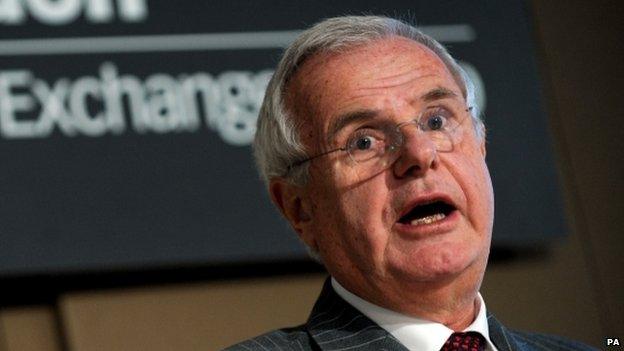Co-op: A very public power struggle
- Published
- comments

Lord Myners quit the Co-op board amid criticism of his plans to reform the business
It must have been a pretty dramatic board meeting. By the end of it Lord Myners, the non-executive director brought in to shake up governance at the Co-op, had resigned and the organisation was facing - yet another - crisis.
The board meeting was on Wednesday. It had hardly wrapped up before details of Lord Myners' dramatic decision were leaked last night. This is a power struggle being played out in public.
It is a power battle not about whether to reform or not reform the Co-op. It is about the type of reform.
Lord Myners wanted a radical shake-up of the board, with something more akin to the structure of a public limited company like Marks and Spencer (which he used to chair). He was supported by Euan Sutherland, the chief executive of the Co-op who once ran B&Q. Mr Sutherland quit last month, external after details of his pay were leaked.
Others in the Co-op, led by the powerful Midcounties Co-operative - the largest independent member of the organisation - were not convinced. Hours before Lord Myners' resignation it was revealed that Midcounties would vote against his proposals., external Then the BBC published details of its submission to the review process. Neither made comfortable reading for Lord Myners.
The chief executive of Midcounties is Ben Reid, a group board member and now one of the most powerful figures in the organisation. In an interview last month, external he made it clear that he backed the present business model.
"The co-operative model is alive and well. It might have taken a few knocks over the last few weeks but we have shown there is a way of doing this. Our movement is bigger than the problems we face," Mr Reid said.
Lord Myners appeared to disagree, describing governance at the Co-op as "shocking". He has left the board, although he says the review will continue. What status that review will have by the time of the Co-op's annual general meeting in May and special general meeting later in the summer is anyone's guess. It will certainly hold less weight. It could, like the proverbial parrot, be very much dead.
Of the four key players who made up the cavalry to rescue the Co-op over the last year, two have gone - Sutherland and Myners.
Two are left. Richard Pennycook, the former chief financial officer of Morrisons, is now interim chief executive of the Co-op Group. Members rate him highly. The other is Niall Booker, the man brought in from HSBC to run Co-op Bank which is now largely owned by American hedge funds. Its refinancing last year left Co-op Group with a stake of just 30%.
I am told that recent board changes at the Co-op Group have tipped the focus of power towards what might be called "the traditionalists" - those who want to see democratic powers retained.
It will be interesting to see whether Ursula Lidbetter, the present chairwoman of the Group, continues in that position. At chief executive level, Mr Pennycook has made it clear he does not want the position long term. Mr Reid must be one of the leading candidates to replace him.
Co-op Bank has now finally confirmed that they will publish their results tomorrow after two embarrassing delays. They will make for more grim reading. Co-op Group results are next week. They are also likely to be miserable. Whatever the outcome of the power battle at the top of the business, Co-op's travails are likely to be in the headlines for a long time to come.
UPDATE 13.15
The troubles at the Co-op have reached the in-tray of the business secretary, who has told his officials it is a "sad day for the co-operative movement". I am told he felt that Lord Myners' attempts at reform were the right way forward, and he fears that without him reform may run into the sand. Co-op, as nearly everyone realises, needs to change.